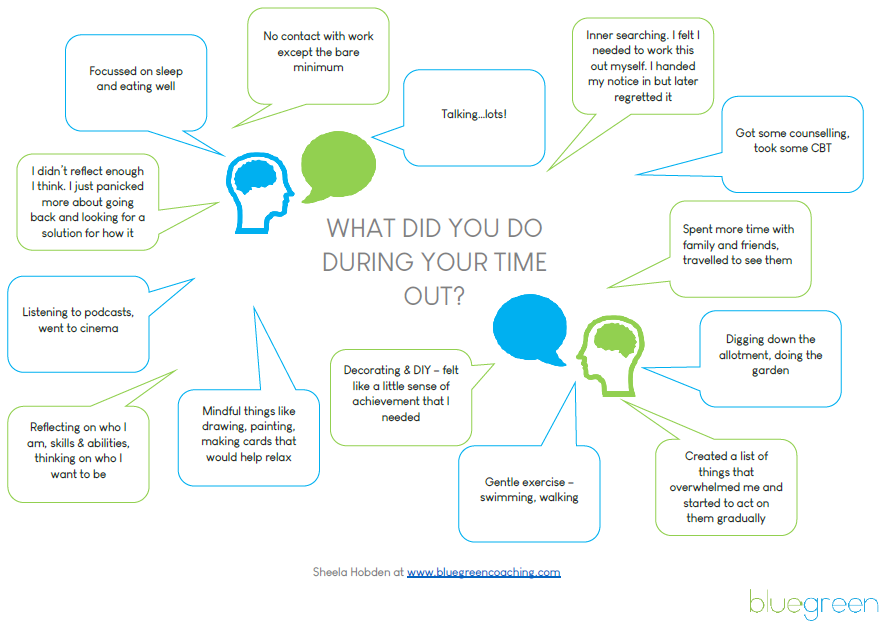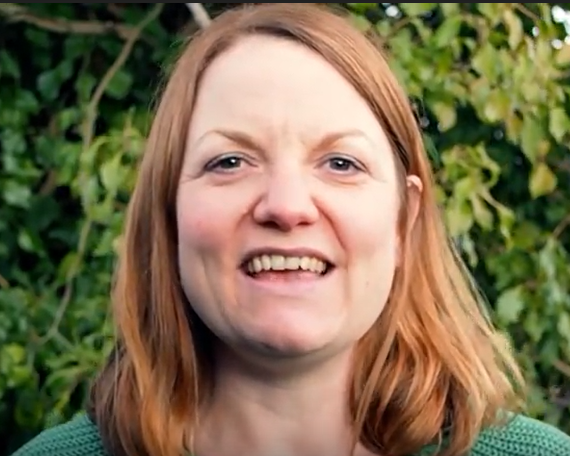
You finally get the courage to recognise you need time out. Work is off the menu. Now what?
“The first days were a total blur. I rested a lot, cried a lot and got help. Gradually I introduced a bit of routine and spent time with friends which helped”.
ANON
Suddenly, after spending so long craving the escape from the workplace, you now actually have a void of empty days ahead of you. In my experience, it felt like it got worse before it got better, I simply didn’t know what to do with myself! I slept A LOT, but found sleeping all day everyday didn’t really work in the long run. But if I do nothing? I continued to worry.
Here’s a collation of the research discussions I’ve had with others who’ve been there, as well as what I (eventually!) found useful to support me in getting back on my feet:
- Firstly, if there is something more underlying that needs exploration, or maybe therapy, take some time to think about how you want to deal with it. If you ignore it now, then anything else you do will just be a sticking-plaster over the top.

The brain loves routine, and it’s even been found that Everyday Routines Make Life More Meaningful. So, make a list of what you will do each day, with timings. This will also give you a sense of achievement when you get it all done.
What should you include on that list?
Be really specific, detailed and most importantly, be sure it is unique to you, and how you like to do things. Some ideas for what to include in your day:
- Review the core well-being factors to form the base:
- Make sure to prioritise Sleep. Get to bed at a regular time, and equally important, get up at the same time too
- Personal grooming. Brush teeth and shower – even if you don’t really feel like it. Get a haircut, cut your toenails, file your nails! Do things that make you feel tidy and good about yourself
- Connect with those you trust; in research from Matthew Liebermann, we are Wired to Connect
- Plan your food and drink; eat properly and at regular times. Keep hydrated although watch out for over reliance on alcohol, caffeine or sugar
- Keep active – where possible get outside, even if its just for a short walk each day. A quick google search will throw up all the evidence you need on the mental and physical benefits of exercise!
- Then start to build in some bigger activities:
- Do something different – book up to do something you either never had time for, or haven’t ever tried before e.g. art, pottery, sheep shearing. Learning something new means we get into a state of “flow”, which is great for a “brain cleanse”
- Begin a basic gratitude practice and mark achievements e.g. celebrate having a shower or getting out of bed if you didn’t really want to – you DID it, you took control
Some ideas to measure your progress:
- Keep a track on emotions, what the triggers are and how to shift them. Personally, I have found the Mood Meter to be a really powerful tool in helping me label emotions, as well as showing me that I can choose to take a little control and decide what I want to do about it.
- Start a super quick “TLC” journal, this could incorporate the gratitude practice above e.g. write 3 things at the end of each day for each Thanks, Learnt, Choice. These can be small things you:
- are Thankful for e.g. sunshine
- Learnt e.g. found a new footpath
- made a Choice on (even if it was which type of tea to drink!)
- If you are struggling with the current world pandemic, and wanting to understand more about the root of the emotions, you may like to review this article I wrote in March 2020 exploring Whats Behind the Pendulum of Emotions around COVID19
Once you are feeling a little more like yourself, here are some other activities/reading you might like to consider (if you haven’t already come across them already):
- Read “A vehicle for well-being”
- Take the “MOT4U” (a guided exploration of the components needed for balanced well-being)
Reading:
And if reading really is your learning modus operandi, then do have a chat with my incredible friend and fellow coach JC Bowers-Brown – Biblio Coach
This article is part of a series:
- How to Know When To Take Time Out for Mental Health
- How to have that Difficult Conversations you’ve been putting off
- What To Do With Time Out for Mental Health
- How to Return Well after a Mental Health break

Sheela Hobden is a Coach at bluegreen Coaching. Following her own mental health battles, she now coaches individuals, runs training sessions and speaks at conferences. She has a real passion for helping medics and healthcare professionals take as much care of themselves as they do their patients in whatever life or career conundrums they face! She is also a Mentor Coach and Coach Supervisor. She has a PGCERT in Business and Personal Coaching, holds PCC member status with the ICF and is CIPD qualified. She challenges herself with ultra distance running and Ironman. Find her at www.bluegreencoaching.com or swimming in the sea, in Poole, Dorset
Get more ideas and tips by joining her newsletter tribe – sign up below!
Better still, book in to speak with her directly?
